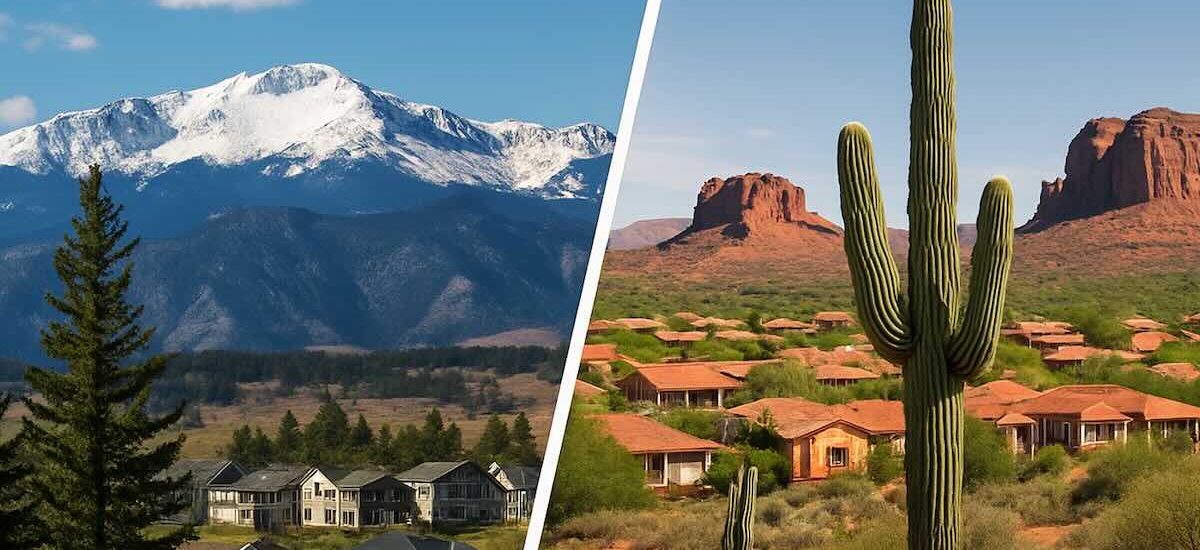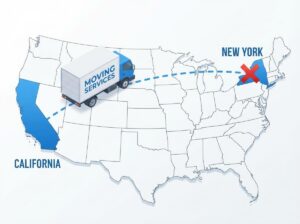Choosing a new home state is a major decision that influences lifestyle, finances, and long-term happiness. Colorado vs Arizona, two of the American West’s most popular destinations, offer distinctly different living experiences. Both boast stunning natural scenery, outdoor recreational opportunities, vibrant urban hubs, and growing economies. However, understanding their differences helps you decide which state aligns with your personal taste, career goals, and family needs.
In this comprehensive guide, we compare Colorado and Arizona across key factors such as climate, cost of living, employment, education, healthcare, culture, and quality of life helping you make an informed choice for your next chapter.
Climate and Outdoor Lifestyle
Colorado’s alpine charm means cold winters with significant snowfall, ideal for skiing and winter sports enthusiasts. Average snowfall in Denver, for instance, is around 60 inches annually, supporting a robust ski industry in resort towns like Aspen, Vail, and Breckenridge. Summers are mild and pleasant, with temperatures averaging in the 80s°F, perfect for hiking, mountain biking, and rafting along the Rocky Mountains.
Arizona’s desert landscape offers hot, dry summers often surpassing 100°F in Phoenix and Tucson, but milder winters make it a haven for sun seekers and retirees. The Grand Canyon and Sonoran Desert provide dramatic backdrops for year-round outdoor activities. Despite harsh summer heat, the dry air keeps humidity low, which many find more comfortable.
Both states appeal to outdoor lovers, but your tolerance for weather extremes will likely decide your preference.
Cost of Living and Housing
Cost of living is a critical consideration for many. As of mid-2025, Denver and Boulder, Colorado report cost of living indexes approximately 15-25% higher than the national average, driven mostly by housing prices. Median home prices in Denver hover around $560,000, influenced by a strong real estate market and limited inventory.
Conversely, Phoenix and Tucson in Arizona tend to be more affordable, with housing costs roughly 20-30% lower than Denver’s. Median home prices in Phoenix sit around $360,000. Utility costs in Arizona also tend to be lower due to energy-efficient desert homes, but high summer cooling expenses can add up.
For budget-conscious families or first-time buyers, Arizona might offer better entry points, whereas Colorado’s premium often reflects its higher average incomes and amenities.
Colorado vs. Arizona: Cost of Living
Groceries
Day to day grocery costs feel pretty similar in both states. The Bureau of Economic Analysis’ Regional Price Parities show overall price levels close to the U.S. average in 2023; Colorado at roughly 101.4 and Arizona at 101.1 (U.S.=100), so neither state is a clear outlier on store prices.1
Tax-wise, both states exempt most groceries from the state sales tax, but some cities add a local grocery tax, more common in Arizona and possible in some Colorado home-rule cities.2, 3, 4 Recent BLS releases also show food-at-home inflation running in the low single digits for both metros in 2025 (Denver and Phoenix each ~3–4% year over year), which tracks with what shoppers are seeing at the register.5, 6
Bills (Utilities)
Electricity tends to be a touch pricier in Colorado, while natural gas is typically pricier in Arizona. In June 2025, average residential electricity prices were 16.16¢/kWh in CO vs. 15.28¢/kWh in AZ.7 For residential natural gas, the June 2025 averages were about $16.20/Mcf in CO vs. $23.73/Mcf in AZ.8
Water and sewer charges are set locally and vary by usage, but both Denver and Phoenix approved 2025 rate adjustments (generally modest month-to-month changes for typical single-family use).9, 10
Taxes
Colorado uses a flat 4.40% state income tax; Arizona uses a flat 2.50% state income tax.11, 12 Average combined state + local sales tax rates are broadly comparable: roughly 7.81% in CO and 8.38% in AZ (mid-year 2025 estimates).13, 14
Property taxes are relatively low in both states, with median effective rates around 0.45% of owner-occupied home value.15
| Category | Colorado | Arizona | Notes |
|---|---|---|---|
| Overall price level (RPP, 2023) | ~101.4 (US=100) | ~101.1 (US=100) | Very similar statewide price levels.1 |
| Groceries – state tax | Exempt (state level); some localities may tax | Exempt (state level); many cities tax | Check city rules; prepared foods are taxable.4, 2, 3 |
| Electricity (res.), June 2025 | ~16.16¢/kWh | ~15.28¢/kWh | Monthly EIA averages; local utility plans vary.7 |
| Natural gas (res.), June 2025 | ~$16.20/Mcf | ~$23.73/Mcf | Monthly EIA averages; usage and plans matter.8 |
| Income tax (state) | Flat 4.40% | Flat 2.50% | See official/state summaries for details.11, 12 |
| Sales tax (avg. combined) | ~7.81% | ~8.38% | Mid-year 2025 averages (Tax Foundation).13, 14 |
| Property tax (effective) | ~0.45% | ~0.45% | Median effective rate on owner-occupied homes.15 |
Heads up: Local rules and utility plans can shift totals quite a bit. Always check your target city and provider.
Colorado vs Arizona Employment and Economic Growth
Colorado: A broad mix of aerospace, tech, renewable energy, and healthcare powers the economy. In April 2025, unemployment was 4.8% (U.S. 4.2%), per the Colorado Department of Labor and Employment. Real GDP grew 2.4% in Q4 2024, then dipped 0.3% in Q1 2025. Even so, the labor force participation rate was a strong 67.8% (U.S. 62.6%), pointing to a deep talent pool.
Arizona: Growth is stable especially around Phoenix with strengths in semiconductors, healthcare, and financial services. In July 2025, unemployment was 4.1% (U.S. 4.2%), according to the Arizona Office of Economic Opportunity. Jobs rose 1.1% year over year (+34,300 from July 2024). Population gains and lower operating costs are helping keep the momentum going.
Bottom line: Colorado brings a high-participation workforce and diverse industries; Arizona edges ahead on recent job growth and operating costs, with big bets in chips and other fast-growing sectors.
Education and Healthcare
On education, Colorado has a strong lineup of universities, University of Colorado Boulder and University of Colorado Denver and many K–12 districts that perform well nationally. The state also tends to spend more per student than Arizona.
Arizona brings plenty to the table too, with University of Arizona and Arizona State University. K–12 results have some catching up to do: in 2024, fourth-grade math averaged 232, below the national 237, according to the Nation’s Report Card.
Healthcare
Healthcare quality is generally higher in Colorado, with greater access to medical professionals. A 2025 report from MoneyGeek ranked Colorado 5th in the nation for healthcare, while Arizona ranked 34th. Colorado scores highly on metrics like health outcomes and access, while Arizona’s system is considered less cost-effective. While access to care varies in both states, Colorado has a higher number of primary care providers per capita.
Culture and Lifestyle
Colorado’s culture is outdoorsy, progressive, and focused heavily on environmental sustainability. Cities like Boulder and Denver offer an eclectic mix of art galleries, craft breweries, farm-to-table restaurants, and music festivals featuring everything from folk to electronic genres.
Arizona’s vibrant culture combines Native American heritage, Western cowboy traditions, and fast-growing urban developments. Tucson is known for its Southwestern cuisine and annual gem and mineral shows, while Phoenix promotes sports enthusiasm with MLB and NBA teams, and sprawling shopping and dining districts.
Both states embrace festivals and cultural diversity, but the lifestyles have distinct flavors shaped by geography and history. You can also check our comprehensive article Best Places to Live in Colorado
Colorado vs Arizona Quality of Life and Safety
Both states rank well on quality of life indicators, though Colorado often scores higher due to better air quality. The Environmental Protection Agency (EPA) tracks air quality, and Colorado generally has fewer days with unhealthy air quality compared to some of Arizona’s more populated desert areas, where high ozone levels can be an issue.
Safety varies a lot by city and even by neighborhood. Statewide, 2023 data from the FBI’s Uniform Crime Reporting (UCR) Program shows Arizona with 409 violent crimes per 100,000 people and Colorado with 474 per 100,000. City trends can move differently: by mid-2025, the Council on Criminal Justice reported Denver’s homicide rate was down about 45% versus 2024.
Bottom line: compare the specific neighborhoods you’re considering, since local patterns changes within few blocks or few miles.
Summary and Decision Considerations
Colorado and Arizona both offer excellent opportunities for living, working, and playing, but which suits you will depend heavily on your lifestyle preferences, career goals, and family needs:
- Choose Colorado if: You want cooler summers, proximity to alpine recreation, strong education and healthcare systems, and a progressive urban culture.
- Choose Arizona if: You prefer warmer, drier weather, more affordable housing options, Southwestern cultural heritage, and a rapidly growing job market with lower operational costs.
Ultimately, both states mix opportunity with desirable natural beauty, so personal priorities will decide the best fit.
Planning a move? Whether to Denver or Phoenix, consulting with professional movers with solid local expertise can ease your transition. Feel free to contact local moving services or explore relocation resources specific to each state for detailed guidance.
Colorado vs Arizona
Choosing between a high-country lifestyle and a sun-soaked desert setting comes down to what feels like home. Once you’ve decided, leave the logistics to movers and put your attention where it belongs: starting fresh. Whether you need a local residential move, a complex long-distance relocation, or a last-minute same-day moving company, Coastal Moving Services is here to help with all your booking needs.
Call a trusted moving company today at +1-334-659-1878 to get a free quote and let them handle the details, so you can focus on settling into your family’s new beginning.
long distance moves
as low as $1748
Long-distance moving all across the United States. Experienced and insured, residential and commercial.
4.9/5 AVERAGE RATING
Sources
- BEA, Regional Price Parities by State and FRED state series for CO & AZ RPP .
- Arizona Department of Revenue, Publication 575: Tax Exempt Food (state grocery exemption; locals may tax).
- Arizona Revised Statutes §42-5102 (food for home consumption exemption at state level).
- Colorado Department of Revenue, FYI Sales 4 & related guidance (food for home consumption exempt from state sales tax; some home-rule cities tax groceries).
- BLS, CPI Denver-Aurora-Lakewood (2025 releases show food-at-home up ~3%–4% y/y in 2025).
- BLS, CPI Phoenix area (2025 releases; food-at-home ~3%–4% y/y).
- EIA, Electric Power Monthly, Table 5.6.A (June 2025): Residential average price, CO 16.16¢/kWh; AZ 15.28¢/kWh.
- EIA, Average Residential Natural Gas Price by State (monthly; June 2025): CO ~$16.20/Mcf; AZ ~$23.73/Mcf.
- Denver Water, 2025 Residential Water Rates (rate change overview).
- City of Phoenix Water Services, Water & Sewer Rates (2023–2025 adjustments; March 2025 increase).
- Colorado General Assembly, Individual Income Tax overview (flat 4.40% rate).
- Tax Foundation, State Individual Income Tax Rates and Brackets, 2025 (AZ flat 2.5%).
- Tax Foundation, Colorado average combined sales tax rate (mid-year 2025 ~7.81%).
- Tax Foundation, Arizona average combined sales tax rate (mid-year 2025 ~8.38%).
- Tax Foundation, Property Taxes by State & County (2025 update; median effective rates; CO & AZ ~0.45%).










